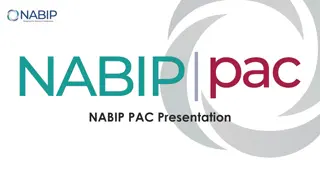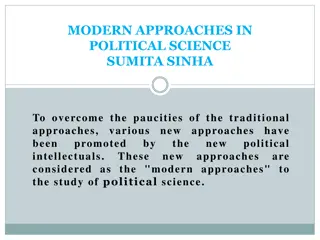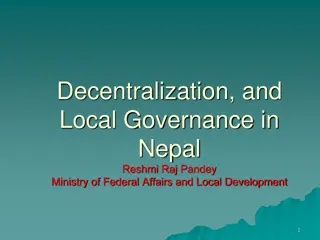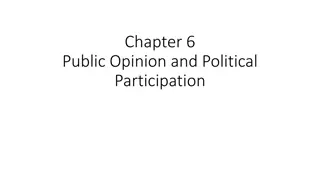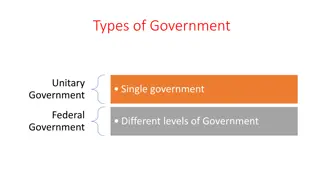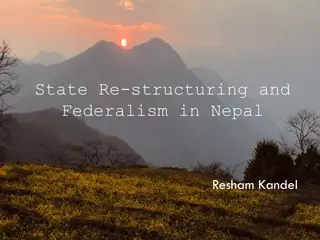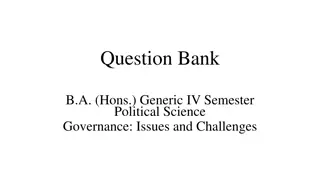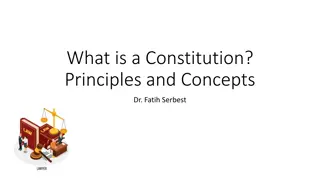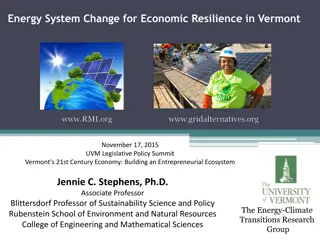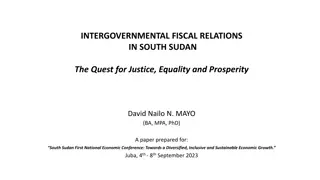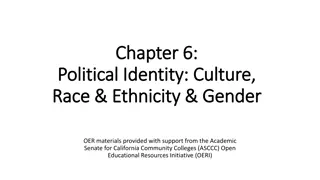Understanding NABIP PAC: Political Action Committee Overview
Federal law prohibits direct financial contributions to federal candidates, hence organizations like NABIP establish Political Action Committees (PAC) to advocate for political priorities. Learn about NABIP PAC, its accounts, eligibility criteria, contribution rules, and how funds are utilized. Disc
1 views • 14 slides
Understanding Decentralization: Insights from International Experience
Insights from international experiences on decentralization policies, focusing on fiscal and political decentralization, with examples from Africa, China, and Latin America. Discusses the limitations of fiscal decentralization and the role of Constituency Development Funds in enhancing accountabilit
1 views • 24 slides
Insights on Decentralization Policies: International Perspectives
Understanding the dynamics of decentralization is crucial for effective governance. Insights from global research highlight the challenges in fiscal decentralization, the significance of political decentralization, and the limited scope of Constituency Development Funds in enhancing local governance
1 views • 24 slides
Contrasting Concepts in Political Science: Normative vs Descriptive Approaches
Normative and descriptive concepts in Political Science explore contrasting viewpoints on how things should be versus how they actually are. While normative claims focus on value judgments, descriptive claims deal with facts. These concepts complement each other by providing both theoretical and pra
0 views • 10 slides
Modern Approaches in Political Science: Overview and Characteristics
Explore modern approaches in political science pioneered by intellectuals to address the limitations of traditional methods. These approaches emphasize empirical data, interdisciplinary study, and scientific methods to draw conclusions beyond political structures and historical analysis. Key modern
1 views • 13 slides
Interdisciplinary Approach in Political Science and Its Relation with History
The need for an interdisciplinary approach in political science emerged in the 20th century to study political issues from various social science perspectives. This approach emphasizes the interrelation between political science and other disciplines like history. History provides the foundation for
0 views • 23 slides
Institutionalism and Methodological Issues in Political Science
Institutionalism is a foundational concept in political science, emphasizing the study of governing institutions and their role in shaping political behavior. It explores inductive and deductive approaches to research, highlighting the significance of empirical evidence and theoretical assumptions.
0 views • 19 slides
State-Sponsored Interreligious Dialogue in the Middle East: A Political Analysis
This research delves into the growth of state-sponsored interreligious dialogue initiatives in the Middle East between 2000-2020. It explores the political significance, impact on relations between political and religious authorities, and implications for religious practices in the region. The thesi
0 views • 23 slides
Understanding Gramsci's Political Theory and its Relevance Today
Gramsci's political theory, focusing on concepts such as hegemony, historical bloc, and the role of intellectuals, offers valuable insights into contemporary political challenges. Explored through the lenses of Prof. Ken Spours and Stuart Hall's analytical tradition, this analysis sheds light on Con
0 views • 13 slides
Evolution of Citizenship in Liberal Democracy
Citizenship within liberal democracy entails equal rights, duties, liberties, and constraints for individuals within a political community. The entrenchment of civil and political rights has shaped the struggle for membership and participation in political communities. Civil rights, essential for in
1 views • 11 slides
Decentralization and Local Governance in Nepal: A Comprehensive Overview
Explore the essence of decentralization and local governance in Nepal, highlighting the process, benefits, and global significance. Understand how these initiatives promote democratization, equity, and effective service delivery while fostering good governance and citizen participation. Discover the
0 views • 32 slides
Understanding Political Theory through a Contextual Approach
Exploring G.H. Sabine's perspective on political theory through a contextual approach, emphasizing the importance of historical context and societal influences. Sabine argues that while political theory evolves with its contemporary politics, it should be analyzed within its specific time and social
0 views • 9 slides
Understanding Public Opinion and Political Participation
Public opinion and political participation are influenced by various factors such as financial interests, family, education, and party identification. Measuring public opinion accurately through scientific surveys is crucial in a democracy. Traditional participation methods like voting and civic vol
5 views • 7 slides
Understanding Fiscal Federalism and Decentralization in Government Systems
Fiscal federalism involves the allocation of responsibilities and resources between central and local governments, addressing key issues such as regulation, incentives for resource transfer, and financial balance. Fiscal decentralization, on the other hand, focuses on transferring taxing and spendin
0 views • 16 slides
State Re-structuring and Federalism in Nepal by Resham Kandel
State restructuring in Nepal involves the redistribution of power across different tiers of government and the redesign of governance structures to achieve political, economic, social, and administrative transformation. The concept focuses on decentralization, inclusivity, and proportional represent
0 views • 26 slides
Analysis of Facebook Affordances for Political Parties During the 2014 EU Elections
Research by Karolina Koc-Michalska and Darren Lilleker explores how political parties across 28 countries utilized Facebook affordances during the 2014 European Parliament elections. The study investigates the impact of social media on voter behavior, community building, and political engagement. Fi
0 views • 22 slides
Challenges and Governance in Political Science: Exploring Policy, Civil Society, and Public Administration
Delve into the multifaceted realm of governance and political science, tackling issues such as policy analysis, civil society engagement, and the role of public administration in addressing public grievances. Explore topics like decentralization, social welfare, and the impact of globalization on st
0 views • 9 slides
Liberal Democracy and Citizenship: Rights, Duties, and Participation
Citizenship in liberal democracies entails equal rights, duties, liberties, and constraints, with a focus on civil and political rights. The entrenchment of these rights has been key in establishing popular sovereignty and individual autonomy. Civil rights, developed in the 18th century, centered on
2 views • 16 slides
Understanding Political Beliefs and Behaviors: A Comprehensive Overview
Explore the formation, evolution, and transmission of political beliefs, as well as the impact of differing beliefs and behaviors on the political process. Delve into platform issues, political affiliations, and their influences to gain a deeper understanding of the political landscape.
1 views • 53 slides
Understanding Nationalism in Political Science
Nationalism, a complex concept, defines the nation as the fundamental unit of political rule. It encompasses a mix of objective and subjective factors, including cultural, ethnic, and political traits. The definition of a nation is subjective, based on how its members perceive themselves as a distin
0 views • 27 slides
Empowering Women in Politics through Media Training in Johannesburg
Regional Media Training on Women's Political Participation held in Johannesburg focused on enhancing women's role in politics through media. The program highlighted successful female political leaders, aiming to change gender norms and increase women's political representation. Key objectives includ
0 views • 10 slides
Political Spectrum and Ideologies Explained
Explore the differences between liberals and conservatives with images depicting their beliefs on government intervention, individual responsibility, gun control, and more. Understand the political spectrum ranging from moderate to liberal to conservative through visual aids. Learn about Democrats a
0 views • 17 slides
Understanding Political Science: A Comprehensive Overview
The study of political science delves into various aspects, from the pursuit of the good society to the exercise of power and the allocation of resources. It encompasses specialized fields such as American politics, international relations, comparative politics, public policy, and political philosop
0 views • 5 slides
Understanding Constitutions: Principles and Concepts
Contemporary constitutions outline the fundamental principles of the state, governmental structures, and citizens' rights in a higher law. Constitutions serve various functions such as defining political boundaries, expressing national identity, establishing rights and duties, regulating political i
0 views • 24 slides
Understanding the Political Context of Public Health in New Zealand
This paper delves into the political landscape of public health in New Zealand, emphasizing the importance of analyzing political influences to enhance public health initiatives. It explores various theories such as Interest Group Theory, Institutional Theory, and Theory of Political Economy to unde
0 views • 20 slides
Political Development Theory and Practice: An Overview
Political development refers to the evolution of institutions forming the political power system of a society. Initially popular in the 60s-70s to describe political change, it later fell out of favor for being Euro-centric but has since regained significance. The concept encompasses aspects like po
0 views • 13 slides
Political Party Funding Act 2018 Overview
The Political Party Funding Act of 2018 in South Africa aims to enhance multi-party democracy by regulating the funding and donations to political parties. It establishes the Multi-Party Democracy Fund funded by private sources, alongside the existing Represented Political Party Fund. The Act prohib
0 views • 17 slides
Understanding Political Party Funding Act of 2018
The Political Party Funding Act of 2018 regulates the funding of political parties in South Africa, ensuring equitable and proportional funding for parties participating in national and provincial legislatures. The Act defines various terms such as donations, foreign persons, and political parties,
0 views • 42 slides
Evolution of Political Ideas and Influences on American Founding
In the history of politics, major ideas like laws of nature, unalienable rights, divine right of kings, social contract theory, and rights of resistance have influenced the American founding. Various traditions such as Judeo-Christian, English common law, Enlightenment, and republicanism played a si
0 views • 68 slides
Energy System Change for Economic Resilience in Vermont
This text discusses the importance of renewable energy transition in Vermont for economic resilience, focusing on the social, political, and cultural dimensions. It highlights the shift from fossil fuel-based to renewable energy systems and the need for inclusive and distributed energy systems to fa
0 views • 14 slides
Intergovernmental Fiscal Relations in South Sudan: A Quest for Justice, Equality, and Prosperity
This paper explores intergovernmental fiscal relations in South Sudan, focusing on decentralization, taxation, spending, grants, equalization, and transfers to oil-producing states. It discusses the importance of fiscal federalism, the evolution of decentralization in Sudan, and the country's depend
0 views • 21 slides
Explore the Fascinating World of Political Science
The Department of Political Science offers a range of courses, delving into topics such as political theory, international relations, and governance. Understand the distinction between politicians and political scientists, and explore branches of political science like public administration and huma
0 views • 16 slides
Understanding Political Identity: Culture, Race & Gender in Society
Explore the intricate aspects of political identity, culture, race, ethnicity, and gender in society. Discover how individuals shape their identities and the impact of political mobilization on society. Uncover the significance of political socialization and the role of societal institutions in shap
0 views • 20 slides
Evolution of Political Protests in Modern Russia: A Historical Overview
This article provides an in-depth analysis of the evolution of political protests in modern Russia from 1990 to present. It discusses the attitude of Russian journalists towards protests, basic concepts of political protest in modern political science, myths surrounding protests in Russia, and the f
0 views • 24 slides
Evolution of Youth Policy in Spain: From Franco's Regime to Present Day
The article discusses the evolution of youth policy in Spain from the absence of explicit policies during Franco's regime to the promotion of youth participation in political, social, economic, and cultural development as mandated by the Spanish Constitution of 1978. It explores the decentralization
0 views • 19 slides
Impact of Political Stability on Equity Trading Costs of Cross-Listed Firms
The research explores the relationship between political stability and equity trading costs of cross-listed firms, highlighting the impact of political institutions, liquidity, and investor protection. It delves into the importance of factors like quality of political institutions, transparency, and
0 views • 24 slides
Interdisciplinary Relationships in Political Science
Political science and history share a symbiotic relationship, with history providing the foundation for political analysis while political science influences historical events. The contribution of economics to political science is evident in how economic conditions shape political ideologies and pol
0 views • 12 slides
Understanding Political Theory: Definitions, Differences, and Significance
Political theory encompasses systematic explanations of political phenomena, distinct from political thought which involves ideas and opinions of philosophers. It constitutes both political science and philosophy, addressing both empirical and evaluative aspects. The significance lies in finding sol
0 views • 7 slides
Remedial Measures Implemented by Indian Political Party
Explore the impactful remedial measures taken by a prominent political party in India through a collage presentation. Delve into the functions of political parties, understanding partisanship, the necessity of political parties, and more. Gain insights into the significance and role of political par
0 views • 23 slides
Centralization vs Decentralization: A Comparative Analysis
This lecture delves into the dynamics of centralization and decentralization in subnational politics, exploring the benefits of each system, differences between federal and unitary government structures, challenges in reconciling territorial differences, reasons for the increasing popularity of cent
0 views • 15 slides
